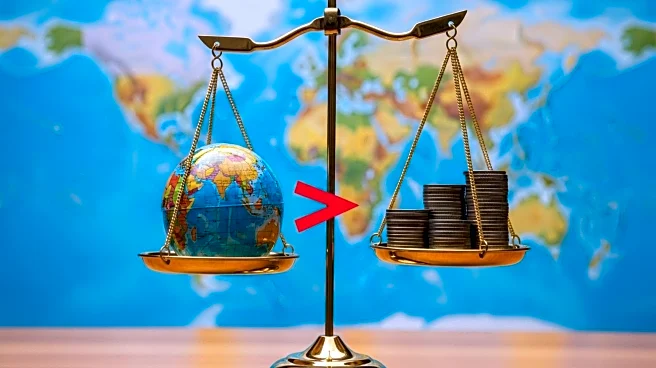What's Happening?
A report from Boston University's Global Development Policy Centre reveals that developing nations are now repaying more to China than they receive in new financing. In 2022 and 2023, these countries collectively repaid $3.9 billion more each year than they borrowed from China. Historically, China has been a significant financier of infrastructure in the Global South, providing over $472 billion through its policy banks, the China Development Bank and the Export-Import Bank of China, between 2008 and 2024. These funds have supported over 900 projects worth $316 billion in sectors such as transport, energy, water systems, and digital infrastructure. The report warns that without a rebound in Chinese overseas lending, growth and climate investment in developing nations could stall.
Why It's Important?
The shift in net debt transfers from China to developing countries highlights a growing strain on economies already facing debt distress and underinvestment in climate action. As the world's largest bilateral lender, China's financial interactions significantly impact the economic stability and development prospects of the Global South. The reduction in Chinese lending could hinder infrastructure development, economic growth, and poverty reduction efforts in these regions. Additionally, the report suggests measures to reinvigorate development finance, such as refinancing distressed loans and expanding green lending, which could benefit both China and its partner countries.
What's Next?
China has announced plans to offer zero-tariff treatment to all 53 African countries with diplomatic ties, aiming to boost imports from Africa and support Chinese state-owned firms facing declining domestic demand. Furthermore, financial alignment between China and African partners is deepening, as evidenced by Kenya's conversion of major Chinese railway loans from U.S. dollars to yuan to reduce interest costs. These initiatives may signal a strategic shift in China's approach to international development finance, potentially revitalizing its lending practices and fostering stronger economic ties with developing nations.
Beyond the Headlines
The evolving financial relationship between China and developing nations could have broader implications for global trade dynamics and geopolitical alliances. As China deepens its economic ties with Africa through initiatives like the zero-tariff treatment and yuan-denominated bonds, it may influence the balance of power in international trade and investment. This shift could also prompt other major economies to reassess their strategies in engaging with the Global South, potentially leading to increased competition and collaboration in development finance.









